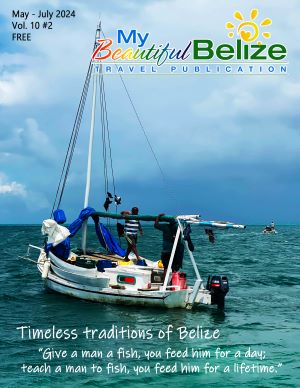Who doesn’t love monkeys and manatees? The two creatures are synonymous when conjuring up images of wild Belize, and both are in dire need of protection. Our country is fortunate to have many individuals and non-profit organizations dedicated to protecting and preserving their vital habitats, with one, who for the last 30 years, also caring for them when injured or orphaned. Often painstakingly nursing them back to health, the grand reward is when sometimes years later, the creatures are successfully released back into their natural home.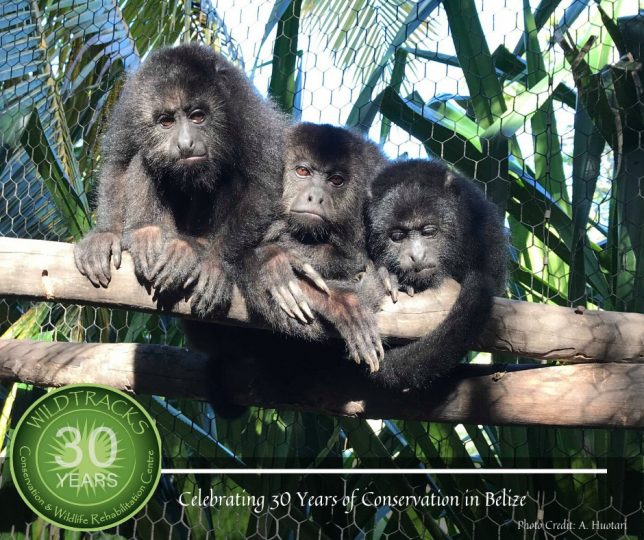 Wildtracks, founded by the dynamic British duo Zoe and Paul Walker, started their good work in 1990 and was registered as an NGO in 1996. Located near Sarteneja, the largest traditional fishing community in Belize within the Corozal District, their altruistic organization not only rescues, cares for and rehabilitates monkeys and manatees but other threatened species as well. Their efforts expand to four different issues; awareness and outreach, sustainable development, threatened species, and habitat conservation.
Wildtracks, founded by the dynamic British duo Zoe and Paul Walker, started their good work in 1990 and was registered as an NGO in 1996. Located near Sarteneja, the largest traditional fishing community in Belize within the Corozal District, their altruistic organization not only rescues, cares for and rehabilitates monkeys and manatees but other threatened species as well. Their efforts expand to four different issues; awareness and outreach, sustainable development, threatened species, and habitat conservation.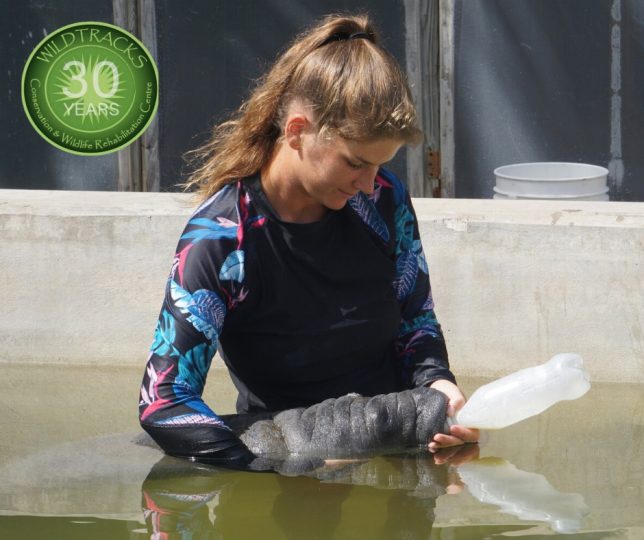 Conservation education, community outreach, and awareness are essential ingredients in developing an appreciation and commitment to wildlife and habitat preservation. Wildtracks outreach programs focus on local schools where they offer hands-on activities to students inside and out of the classroom. Through learning about terrestrial and marine ecosystems and their delicate balance, students earn a better understanding of why it is important to protect them. Past students have grown to be environmental stewards, now leading conservation organizations, sustainable tourism initiatives, and inspiring new generations – demonstrating the success of sustained outreach programs.
Conservation education, community outreach, and awareness are essential ingredients in developing an appreciation and commitment to wildlife and habitat preservation. Wildtracks outreach programs focus on local schools where they offer hands-on activities to students inside and out of the classroom. Through learning about terrestrial and marine ecosystems and their delicate balance, students earn a better understanding of why it is important to protect them. Past students have grown to be environmental stewards, now leading conservation organizations, sustainable tourism initiatives, and inspiring new generations – demonstrating the success of sustained outreach programs.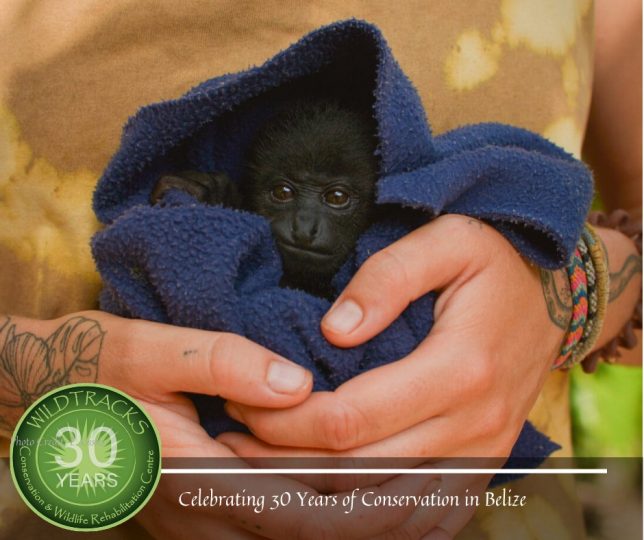 Balancing conservation and sustainable development are vital to maintaining important habitats while accommodating human progress and growth. Working closely with stakeholders in identifying solutions to sustainable development issues, Wildtracks participates in building community capacity and mentors’ organizations to meet this balance. Locally they partner with the village of Sarteneja in improving the sustainability of the local fishery and promote income diversification. Nationally they have offered facilitation in national planning for biodiversity and sustainable development, playing important roles in the development of Belize’s National Biodiversity Strategy and Action Plan and the Belize Report to the Convention on Biological Diversity for the Government of Belize to name a few. They passionately advocate for habitat conservation, collaborating with the community, nonprofit organizations, the tourism industry, and natural resource consumers and manage two privately protected areas in the Corozal District, Fireburn and Balam Na.
Balancing conservation and sustainable development are vital to maintaining important habitats while accommodating human progress and growth. Working closely with stakeholders in identifying solutions to sustainable development issues, Wildtracks participates in building community capacity and mentors’ organizations to meet this balance. Locally they partner with the village of Sarteneja in improving the sustainability of the local fishery and promote income diversification. Nationally they have offered facilitation in national planning for biodiversity and sustainable development, playing important roles in the development of Belize’s National Biodiversity Strategy and Action Plan and the Belize Report to the Convention on Biological Diversity for the Government of Belize to name a few. They passionately advocate for habitat conservation, collaborating with the community, nonprofit organizations, the tourism industry, and natural resource consumers and manage two privately protected areas in the Corozal District, Fireburn and Balam Na.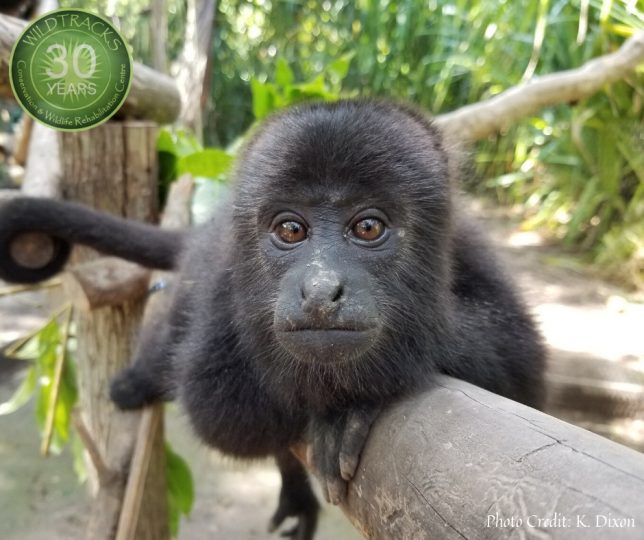 In concert with government and non-profit organizations for the conservation of threatened species, their rescue and rehabilitation programs care for injured or orphaned primates and manatees. As the only rehab center in the county, they also receive primates confiscated by the Belize Forest Department. There are two species of primates in Belize, Geoffroy’s spider monkey, and the Yucatan black howler monkey. Globally they are both endangered, and in Belize, their populations are threatened by the illegal pet trade and deforestation. Rehabilitation can be a lengthy process, taking months, even years before one is ready for wild release.
In concert with government and non-profit organizations for the conservation of threatened species, their rescue and rehabilitation programs care for injured or orphaned primates and manatees. As the only rehab center in the county, they also receive primates confiscated by the Belize Forest Department. There are two species of primates in Belize, Geoffroy’s spider monkey, and the Yucatan black howler monkey. Globally they are both endangered, and in Belize, their populations are threatened by the illegal pet trade and deforestation. Rehabilitation can be a lengthy process, taking months, even years before one is ready for wild release.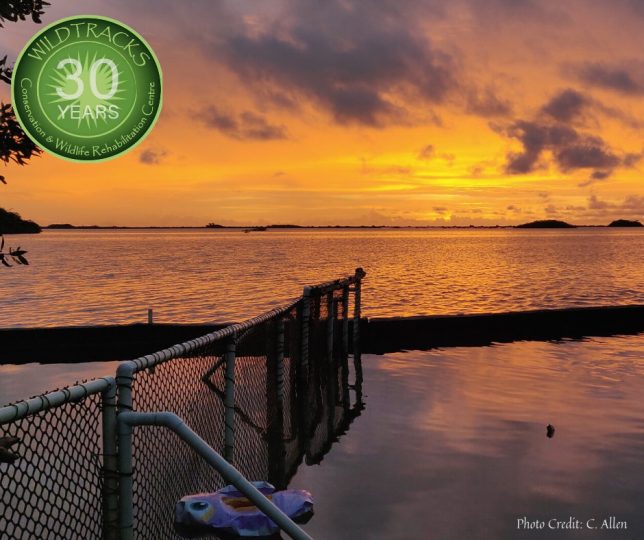 The Antillean manatee, a sub-species of the West Indian manatee, is globally endangered as well. With a regional stronghold in Belize of an estimated population between 700 to 1,000, these ‘sea cows’ are facing a rapid decline due to boat collisions and reduced habitat. Utilizing a team of manatee vets and biologists, their renowned Manatee Rehabilitation Center, established in 2000, is critical to the care of distressed manatees. They have successfully released six manatees back into the wild and have eight more currently in care, preparing for release in the coming years. With the wild population so low it is important that when possible, rehabilitated individuals are returned to the wild to contribute to their dwindling population.
The Antillean manatee, a sub-species of the West Indian manatee, is globally endangered as well. With a regional stronghold in Belize of an estimated population between 700 to 1,000, these ‘sea cows’ are facing a rapid decline due to boat collisions and reduced habitat. Utilizing a team of manatee vets and biologists, their renowned Manatee Rehabilitation Center, established in 2000, is critical to the care of distressed manatees. They have successfully released six manatees back into the wild and have eight more currently in care, preparing for release in the coming years. With the wild population so low it is important that when possible, rehabilitated individuals are returned to the wild to contribute to their dwindling population.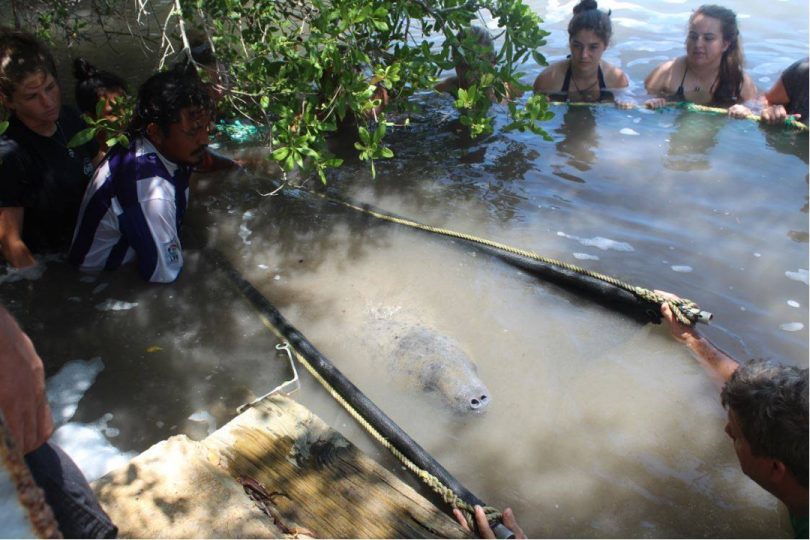 None of this could be possible without the Wildtracks Volunteer Program, where countless volunteers have assisted them from the beginning. Receiving invaluable hands-on experience for those studying the many facets of Wildtracks’ mission, or for those who just want to help, their time spent can be grueling, with attentive critter care 24/7, late-night feedings, cleaning cages and of course plenty of poop. But the rewards far outweigh the challenges, and the feeling of nursing an animal back to health and releasing it back to its wild home is priceless. Working with other organizations is also essential to their success, and they are proud to partner with the Government of Belize Forest Department and collaborate with national and international NGO’s such as the Save the Manatee Club, Huston Zoo, Belize Wildlife, and Referral Clinic and the Sarteneja Alliance of Conservation and Development. As a 501(c)(3) non-profit corporation registered in the USA, essential tax-deductible funding comes from like-minded organizations and individuals who share their commitment to conserving wildlife while building a sustainable future for all. For more information about Wildtracks and how you can donate, please visit their website at www.wildtracksusa.org.
None of this could be possible without the Wildtracks Volunteer Program, where countless volunteers have assisted them from the beginning. Receiving invaluable hands-on experience for those studying the many facets of Wildtracks’ mission, or for those who just want to help, their time spent can be grueling, with attentive critter care 24/7, late-night feedings, cleaning cages and of course plenty of poop. But the rewards far outweigh the challenges, and the feeling of nursing an animal back to health and releasing it back to its wild home is priceless. Working with other organizations is also essential to their success, and they are proud to partner with the Government of Belize Forest Department and collaborate with national and international NGO’s such as the Save the Manatee Club, Huston Zoo, Belize Wildlife, and Referral Clinic and the Sarteneja Alliance of Conservation and Development. As a 501(c)(3) non-profit corporation registered in the USA, essential tax-deductible funding comes from like-minded organizations and individuals who share their commitment to conserving wildlife while building a sustainable future for all. For more information about Wildtracks and how you can donate, please visit their website at www.wildtracksusa.org.


